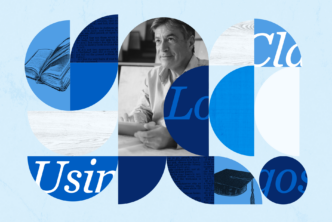As seminarians, we swing between two world—books and people. Reading theological books and articles is a taxing experience. Heavy commentaries make a dent on our cheap faux wood shelves. PDFs and e-books suck up our bytes. We read. We read. We read. Squeezed between reading assignments, we write. Thousands of books surround us, and thousands of people surround us. Books compete with family, friends, church fellows, and co-workers for time and attention. When we cannot do both well, frustration arises. And the thought of total seclusion away from people can be appealing.
That thought manifested itself in me at some points during the past year. Some people observed that I’d become increasingly withdrawn. For me, books were less messy than people and looked prettier on shelves than people did.
Fortunately by reading more books last summer, I was able to find an antidote to my frustration. It’s ironic, I know. But these were biographies (Geerhardus Vos and George Eldon Ladd) and a memoir (Lewis B. Smedes). These men were professional theologians, pastors, or both. Much profit is to be gained by observing how they interacted with people during their time of formal learning.
Lewis B. Smedes, a Professor of Theology and Ethics at Fuller Theological Seminary, recounts in his Calvin Seminary days when he was assigned a pastoral duty to a congregation, composed of mostly farmers, in a small rural town. From this experience, he realized that he ‘could preach sermons in a language that uneducated (though intelligent) farm folk found easy to grasp and, now and then, even interesting’ (71). To preach authentically at their level enthralled him. By utilizing his experience with those outside of seminary context, he could speak to people of various backgrounds. Smedes, a man who presented his doctoral dissertation on Athanasius’ argument for Christ’s incarnation to a small University committee, later spoke about the human need for forgiveness onOprah, before millions of viewers. The contrast between these two kinds of audience was vast.
Geerhardus Vos, a Professor of Biblical Theology at Princeton Theological Seminary, was described as ‘retiring and modest’ in his teaching days (20). During summer break, Vos and his family lived in a rural Pennsylvania town for 26 years, yet his neighbors could not remember if they ever spoke with the family. The characteristic rings true for young Vos at Calvin and Princeton Seminaries, who was not keen on public attention. His presence, both as student and professor, rarely ventured outside of his classroom. For this reason, his social relationships were limited to professors and students. Regarding family, he maintained warm relationships with them very ably.
George Eldon Ladd, a Professor of New Testament at Fuller Theological Seminary, as a student, even later as a professor, neglected his wife and two children in order to pursue an academic career. The biography reveals how much Ladd contributed to evangelical scholarship in the 1950s-70s, and at the same time, how little Ladd contributed fatherly love to his children, who later grew bitter against him. Retreating from fractured family relationships, Ladd preferred the world of books to the world of people who he should have cherished.
The antidote I received from reading these books was theblessing of knowing people around me. Each man had various people issues. Smedes interacted with midwestern farmers and worldwideOprahviewers. Vos chose to limit himself to his professional circle and family, and rarely got involved with any church affair. Ladd left a legacy of scholarship that sought to dismantle Bultmannism and Dispensationalism, but at the cost of losing his family. All of them made a choice regarding books and people.At times, some moved between the worlds with ease; at times, some didn’t. But they were all blessed with opportunities to read and build relationships.
Seminary is a time of blessing; however, through my withdrawal from people, the learning ceased to be a blessing to my family, friends, church fellows, and co-workers. From time to time I have to close my book to open up a box of spaghetti noodles to cook dinner for the family.
Books listed above areMy God and I: A Spiritual Memoir by Lewis B. Smedes,Letters of Geerhardus Vos by Geerhardus Vos and edited by James T. Dennison, Jr., andA Place at the Table: George Eldon Ladd and the Rehabilitation of Evangelical Scholarship in America by John A. D’Elia





